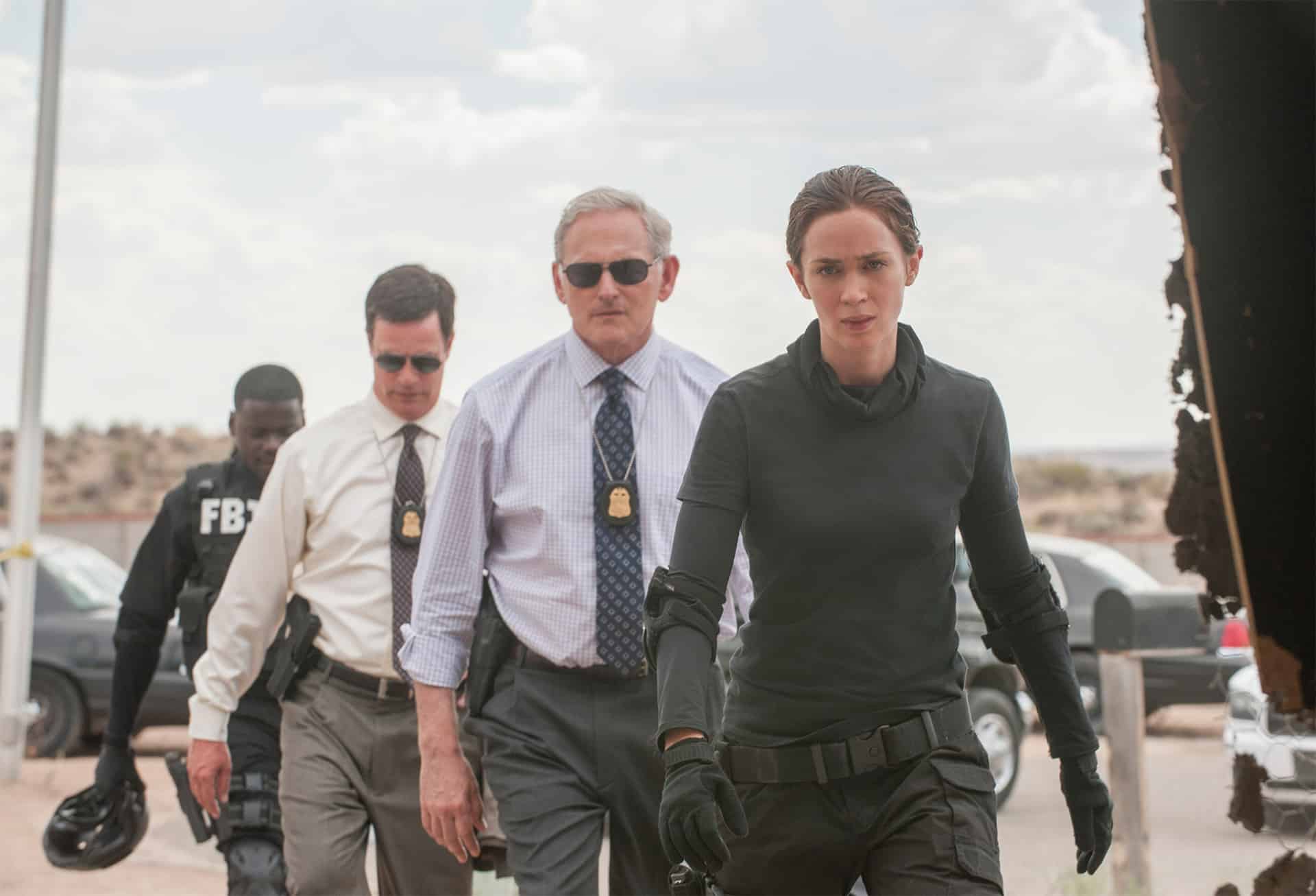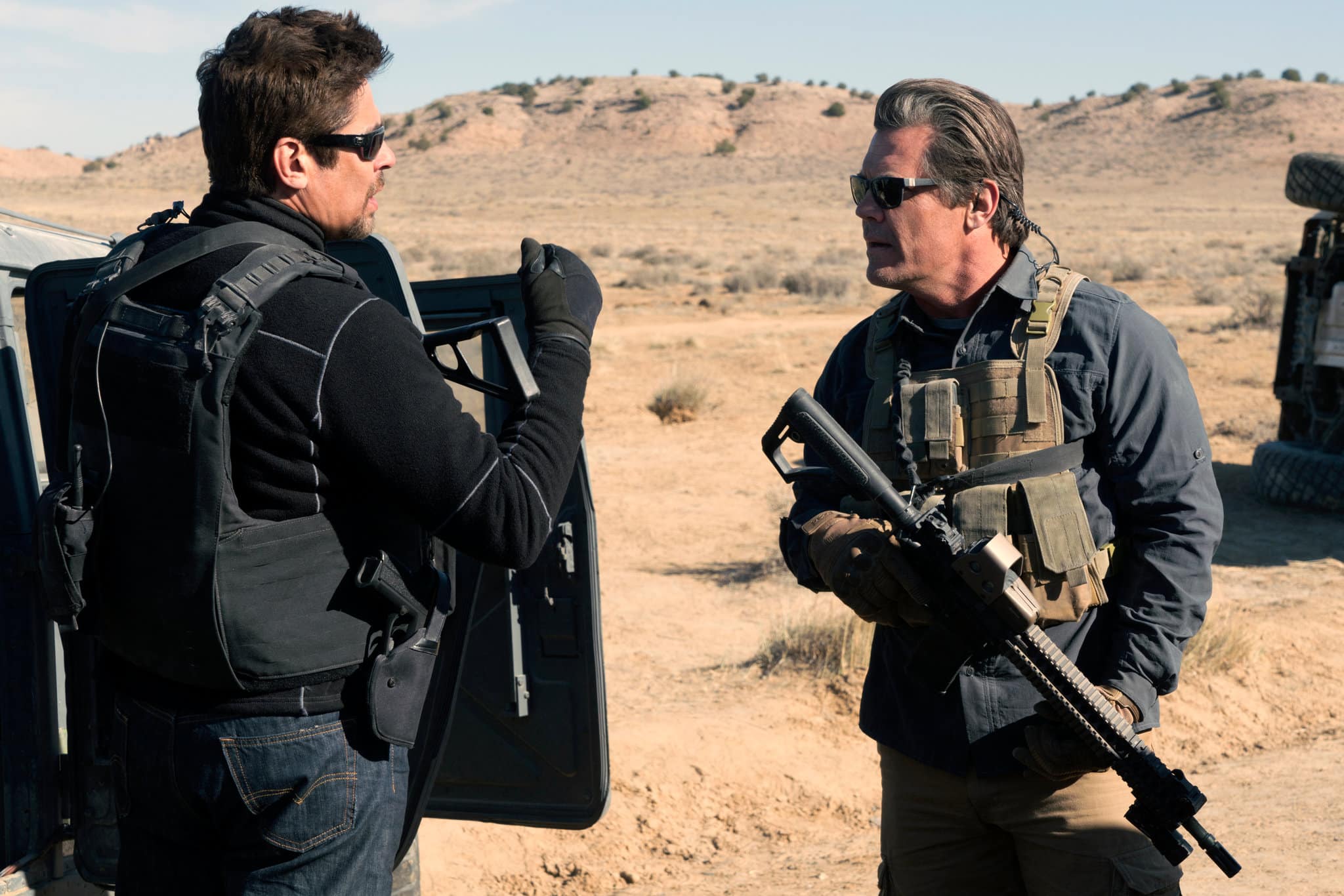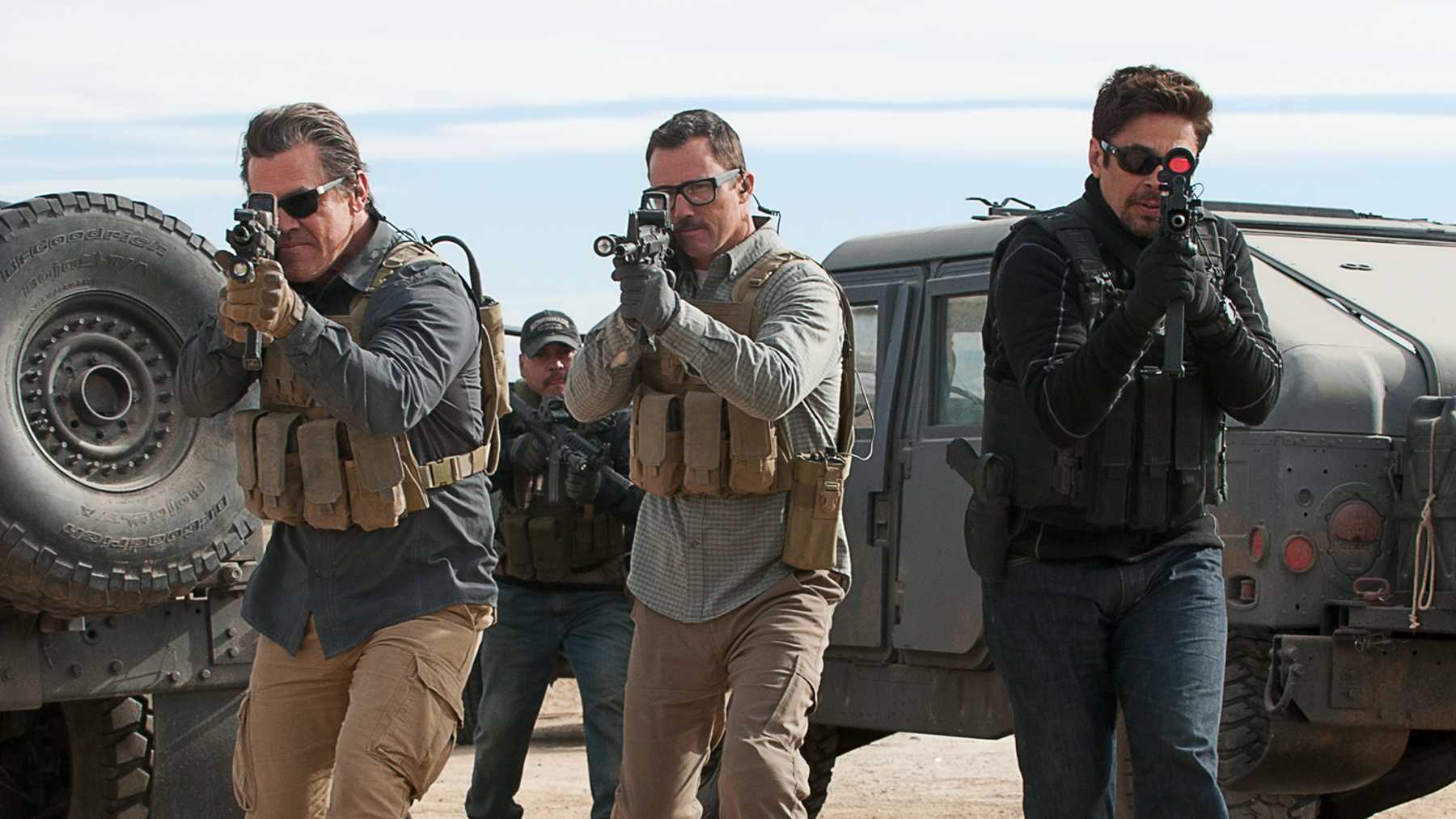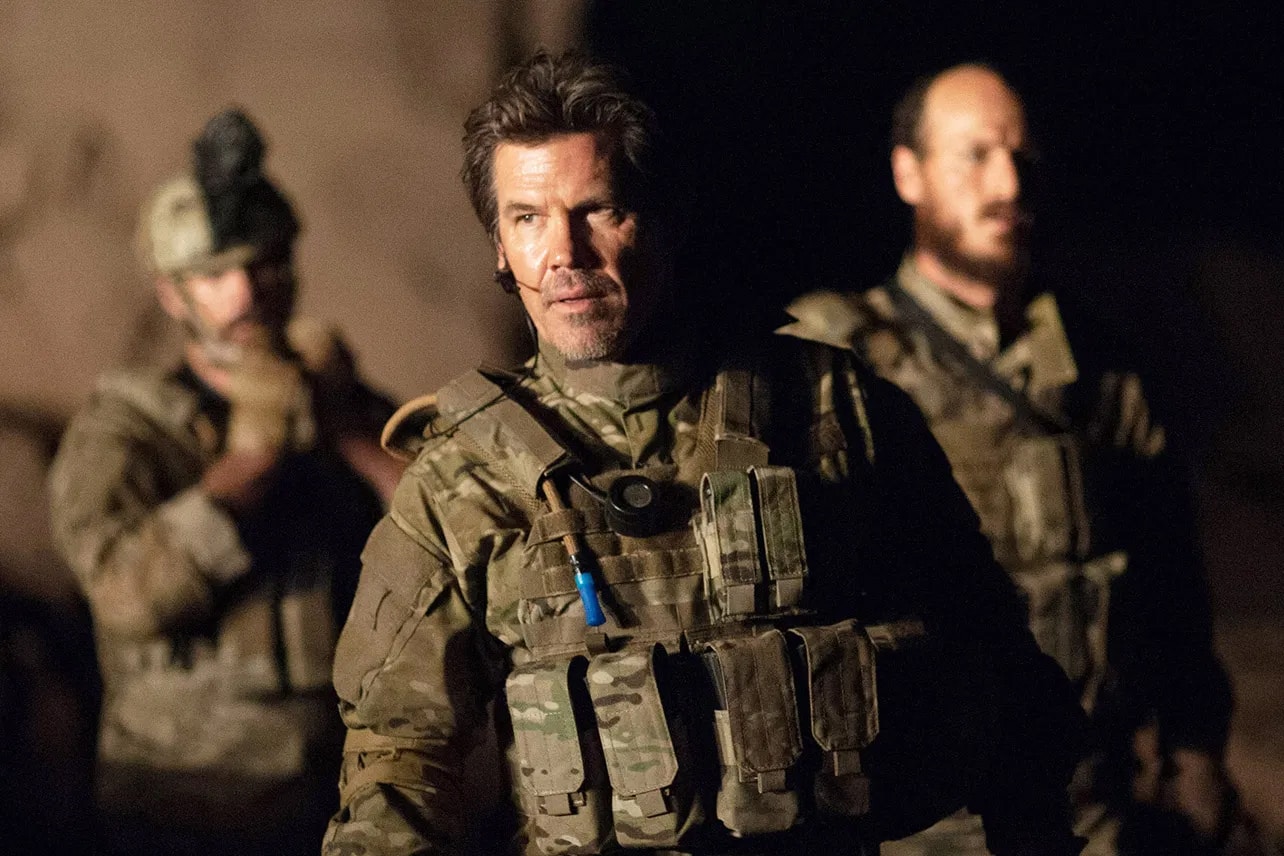Sicario Depicts a Forever War on the Final Frontier
Sicario is a 21st centred western. It is also a state of war film. Information technology is a film about liminal spaces and the fateful chaos that unfolds at the edge of the frontier.
Sicario is directed aside Denis Villeneuve and bears many of the hallmarks of the director's mainstream Movie industry work — the polished yield, the oppressive atmosphere, the cold insulation. However, Sicario is perhaps best understood as break u of author Taylor Sheridan's "frontier trilogy." This disconnected trio of films from three distinct directors updates the western for a new get on, juxtaposing that quintessential Earth genre with a larger story of decline and collapse.
Villeneuve's Sicario would be followed by David Mackenzie's Hell surgery High Water. In Hell Beaver State High Water, the posterity of settlers who had displaced the indigenous population were themselves being roofless past the relentless churn of capitalism. Joseph Deems Taylor Sheridan would envelop up the triptych with Wind River, a film many explicitly adjusted on the experience of those Native American communities that had earlier populated the frontier.
Sicario is localize at the literal edge of the frontier, albeit to the south rather than the West, against the established border between Mexico and the United States. The western genre is shapely on the fantasy of expanding upon, a continent waiting to be tamed by settlers pushing westward in an expression of "manifest destiny." That makes a abut by definition the end of the western, a barrier on that mythical frontier.
Sicario is fascinated with boundaries. Villeneuve populates the film with shots structured around clear lines and demarcations: the residential area communities nerve-racking to visit order on the desert, the fences that delineate the border, the overhead shots of long stretches of highway that cut across the terrain like scars, even the familiar road markings visible in headlights in the dead of night. Characters are ever aware of the lines in the world around them.

Some of these boundaries are metaphorical rather than literal. FBI Broker Kate Macebearer (Emily Blunt) spends most of Sicario confused and disoriented by the operation that she has joined. However, she repeatedly tries to constitute ground rules. When Matt Graver (Banter Brolin) tells her to follow the trail of the esoteric Alejandro Gillick (Benicio del Toro), she replies, "I'm not authorized to be orders from Alejandro!" Later, she protests, "I'm not a soldier. This is not what I do."
Over the flow from of the shoot, information technology becomes perspicuous that Macer has been drafted into a CIA mathematical operation on American soil to effectively provide legal coverage. Macer's supervisor, Dave Jennings (Master Garber), assures her that it is all technically legal. "If your fear is operating out of bound, I am telling you, you are not," helium assures her. "The boundary's been moved." All the same, these boundaries are still very fine. A great deal is made of what Macer toilet operating theater cannot spectator. She is herself bound.
Of course, these fragile barriers and boundaries exist to be crossed. They are non strong enough to withstand attack. The film's hatchway sequence literalizes this, with a motortruck smashing through and through the wall in of a suburban theatre. During a maraud on a corporate trust safehouse, a stray bullet reveals horrors lurking in the fence in: There are countless decaying corpses arranged inside the walls of the house. It is a none-too-subtle optical metaphor for what happens when these constructed barriers come billowing down.
Sicario is populated aside characters who crabby these boundaries. Mace's cooperator, Reggie Wayne (Book of the Prophet Daniel Kaluuya) correctly deduces that Graver is a CIA operative. "CIA's not supposed to work this side of the fence," he explains. The climax involves a maraud into Mexico, which represents a dramatic circumvent. "We have zero jurisdiction in Mexico," Macebearer points outer. However, it is all lawless. Naturally, that operation takes put back at twilight, although night vision renders it in black and light-skinned.

Sicario is a war movie. However, it is an abstract state of war moving-picture show. Although it is situated against the backdrop of the War connected Drugs and stars Benicio del Toro, information technology is not intended as a snapshot of that conflict in the way that Dealings was. While it is often likened to Kathryn Bigelow's Zipp Dark Xxx, information technology is nowhere near as nice in its coordinate system. Sicario exists at the blurred edges of the State of war on Drugs and the Warfare connected Terror. After every, Wayne recognizes men comparable Graver from his time in Republic of Iraq.
In this context of use, the very idea of war becomes an expression of the frontier myth. Wars provide other world to be conquered, another wilderness to make up domestic. Wars provide purpose. They shape identity. They forge the about important of boundaries, the line between us and them. However, the challenge of wars is that they cease. A good deal like the In the north American celibate gives way to the unyielding Pacific, war gives way to peace. This is true straight of ideological wars, like the Cold War.
The War on Terror and the State of war on Drugs are different. The War on Terror is "difficult to define" and much a war "has no end." President George W. Bush repeatedly defined the State of war on Holy terro as "a job that does not oddment." The frontier becomes limitless. Over the course of Sicario, it becomes make that Graving tool is not combat-ready to end the war, simply to perpetuate it. "What's our objective?" Macer asks. "To dramatically overreact," Pointrel replies. Helium is trying to "shake the tree and make chaos," to fix "noise," to "stir the sens."
Critics ilk Chris Ryan have observed that Sicario is a descendant of Coppola's Apocalypse Now, a Vietnam State of war movie that is ultimately a meditation on humankind's obsession with "these acts of mutual devastation." Lustrelessness Barone delineate Kate Macer as "the Capt. Willard (Martin Sheen) in Sicario's Apocalypse Now-like the devi-storm of bleakness." These comparisons are apt. Apocalypse Now was drawn from Joseph Conrad's Heart of Darkness, lending its exploration of war a primal caliber.

However, at that place is an interesting distinction to be made. In Apocalypse Now, Willard makes a linear journey down river to find and eliminate Colonel Walter E. Kurtz (Marlon Brando). As Willard embarks connected his journey, he pushes deeper and deeper into madness. In the Redux cut, He even seems to journey back soon enough. The journey in Book of Revelation Instantly might be as metaphorical Eastern Samoa literal, and mightiness be inward rather than outward, but it is still a clear progression.
In contrast, Sicario skips back and Forth River across the border, demonstrating that these boundaries by which the characters define themselves are ultimately meaningless. CIA operative Steve Forsing (Jeffrey Donovan) evokes Hell in his description of Ciudad Juarez as "the Beast," but the underworld is non exclusive to unity lateral of the border. As he prepares to waterboard Guillermo Díaz (Edgar Arreola), Alejandro taunts the captive, "Nowadays you'll learn what's hell in Yankee land."
Villeneuve's camera is repeatedly drawn to the rubber bands that hold the cartel's money. After a raid outside a Texan bank, itself a midwestern trope, the film lingers escaped bands as agents pucker up the Cash. Afterward, a elder cartel figure fidgets with a set as he watches the tidings. American state police officer Ted (Jon Bernthal) exposes himself arsenic a combine operative when he pulls a band from his pocket. These bands look a more veracious reflection of the situation than the film's set lines: They are spinnable, there's zero beginning or end, and they loop around.

Sicario is wax of twisted reflections. Graving tool rejects Wayne from his task force because there are "no lawyers on this train," even though Alejandro used to live a prosecutor in United Mexican States. Alejandro's entire family was savagely murdered at the behest of Fausto Alarcón (Julio Cesar Cedillo), and he responds by brutally murdering Alarcón's family. Before he dies, Alarcón asks, "Do you recollect the people that sent you hither are any various? Who do you recollect we learned it from?"
This equivalence runs through Sicario. Díaz's captive convoy is attacked at the border crossing. "What are the rules here?" asks one spokesperson in the wireless, Eastern Samoa the latent hostility heightens. "We must be engaged to engage," comes a response. When the team asks whether they can buoy leave their vehicles to found a protective parameter, they are instructed, "You can do what they do. If they go out, you get unsuccessful." The border is no more a boundary, but a mirror.
This is the horror of Sicario's frontier state of war, a difference of opinion waged for No greater aim than to perpetuate its own existence. In its own way, this is a purer distillment of the idea of warfare than that depicted in Apocalypse Now; here is no advance, atomic number 102 journey, no introspection. There is only a forever war — and with it a everlastingly frontier.
https://www.escapistmagazine.com/sicario-depicts-a-forever-war-on-the-final-frontier/
Source: https://www.escapistmagazine.com/sicario-depicts-a-forever-war-on-the-final-frontier/
0 Response to "Sicario Depicts a Forever War on the Final Frontier"
Post a Comment